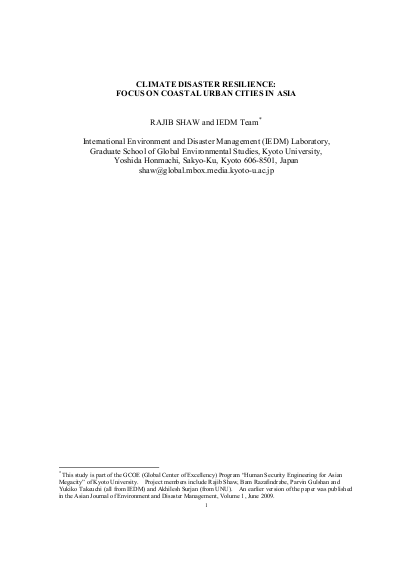
Recognizing the ever-increasing vulnerability of coastal urban cities in Asia due to climate change impacts and variability and also due to fast-growing urban development, this study focusing on climate disaster resilience is conducted in order to measure the existing level of climate disaster resilience of the targeted areas using a Climate Disaster Resilience Index. The index is developed based on five resilience-based dimensions: natural, physical, social, economic and institutional. The scope of this study is limited to climate-induced disasters, such as cyclone, flood, heat wave, drought and heavy rainfall induced landslide. For each individual city case, resilience information is presented as overall resilience, and separate physical, social, economic and institutional resilience. Higher values of resilience are equivalent to higher preparedness to cope with climate and disasters and inversely. Based on the results, policy points and recommendations are suggested by the authors and provide encouragement of city governments’ engagements in specific cist services, institution and capacity building. Not only are outputs from this study useful for city governments, but they also provide valuable knowledge and information to other local and national stakeholders having a similar target: the enhancement of community resilience.
Resource collections
- Climate emergency
- UN Habitat - Urban Response Collection
- Urban Response - Urban Crisis Preparedness and Risk Reduction
- Urban Response Collection - Community Engagement and Social Cohesion
- Urban Response Collection - Economic Recovery
- Urban Response Collection - Environment and Climate Change
- Urban Response Collection - Housing, Land and Property
- Urban Response Collection - Urban Crisis Response, Recovery and Reconstruction
- Urban Response Collection - Urban Resilience